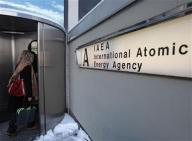 A U.N. nuclear watchdog report is expected to show concern that Iran benefited from foreign expertise to help develop technology that could be used to build atomic bombs, Western officials said on Monday.
A U.N. nuclear watchdog report is expected to show concern that Iran benefited from foreign expertise to help develop technology that could be used to build atomic bombs, Western officials said on Monday.
Tehran is “clearly trying to reach out to nuclear scientists around the world,” a Western diplomat accredited to the U.N. agency in Vienna said, suggesting it was a case of Iran contacting individuals rather than their governments.
Other Western officials painted a similar picture of suspected foreign involvement in providing know-how for activities seen as geared to developing a nuclear weapons capability, but it was unclear how extensive it had been.
The Washington Post reported that Iran has received assistance from experts abroad, including a former Soviet weapons scientist, to overcome technical hurdles in mastering the critical steps needed to build nuclear weapons.
The Vienna-based diplomat said concern that Iran had tried to work with foreign scientists was likely to be reflected in a keenly awaited report this week by the International Atomic Energy Agency (IAEA), the U.N. atomic body.
But the document, which is likely to heighten suspicions about Iran’s nuclear intentions, was not expected to name any such experts, the diplomat added.
Iran denies allegations it is covertly working to develop nuclear arms and insists its program is aimed at generating electricity so that it can export more of its oil and gas.
But Tehran’s history of hiding sensitive nuclear activity from the IAEA, continued restrictions on IAEA access and its refusal to suspend work that also can also yield atomic bombs have drawn four rounds of U.N. sanctions, as well as separate punitive steps by the United States and European Union states.
Western powers may seize on the report to press for more sanctions on Iran, analysts and diplomats say.
KHAN NETWORK
The IAEA listed several areas of particular concern regarding possible military dimensions to Iran’s nuclear work in a report in May, including weapons-relevant experiments.
These included “multipoint explosive detonation and hemispherical detonation studies involving highly instrumented experiments … work which may have benefited from the assistance of foreign expertise.”
It did not give details at the time. But The Washington Post said the Soviet-era scientist was contracted in the mid-1990s to assist in developing and testing an explosives package that Iran apparently incorporated into its warhead design.
The scientist had acknowledged his role but said he thought his work was limited to assisting civilian engineering projects, the newspaper said, adding there was no evidence the Russian government knew of his activities.
Proliferation expert Shannon Kile said he did not see any non-military uses for explosives development that reportedly took place at the Parchin military complex southeast of Tehran, but that generally such work could have civilian uses.
“There you would probably be able to find foreign expertise that could help you. They might not necessarily know that they are actually helping a clandestine nuclear program,” said Kile of the Stockholm International Peace Research Institute.
The Western diplomat said the IAEA report would also address Iran’s past links to a network run by the Pakistani nuclear scientist A.Q. Khan that was dismantled some seven years ago.
In the world’s biggest nuclear proliferation scandal, Khan confessed in 2004 to selling nuclear secrets to North Korea, Iran and Libya.
Iran also relied on foreign experts to supply mathematical formulas and codes for theoretical design work, some of which appear to have originated in North Korea, The Washington Post said. It was not clear if this would be in the IAEA report.
Isolated North Korea has detonated two nuclear test devices since 2006 and six-nation talks aimed at getting it to dismantle its nuclear weapons program collapsed two years ago.
Foreign assistance “helped speed up (Iran’s nuclear program), you saw that quite clearly with the A.Q. Khan network,” a Western official told Reuters. “But at the same time Iran is trying to do things on its own. They want to be autonomous.”
Reuters

Leave a Reply
You must be logged in to post a comment.